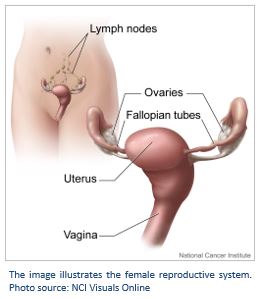 A catalogue of molecular aberrations that cause ovarian cancer is critical for developing and deploying diagnostics and therapies that will improve patients’ lives. Because a comprehensive molecular view of cancer is important for ultimately guiding treatment, the National Cancer Institute (NCI) Clinical Proteomic Tumor Analysis Consortium (CPTAC) has released the cancer proteome confirmatory ovarian study data sets. CPTAC has analyzed protein abundance and phosphorylated proteins in approximately 100 confirmatory ovarian tumor tissues, which includes tumor and adjacent normal samples. The confirmatory ovarian data extends the observations from The Cancer Genome Atlas (TCGA) ovarian proteome study published in Cell and lays the groundwork for further proteogenomic stratification of ovarian tumors. These samples have also undergone genomic characterization and analysis. The genomic data will be available from the NCI Genomic Data Commons. The two Proteome Characterization Centers (PCCs) Johns Hopkins University and Pacific Northwest National Laboratory (PNNL) both investigated the tumor samples by liquid chromatography-tandem mass spectrometry (LC-MS/MS) tandem mass tag (TMT) 10-plex isobaric labeling for protein quantification. Additionally, PNNL contributed phosphoproteomic assessment. The PCCs used an Orbitrap Fusion Lumos mass spectrometer for analysis. The data released include the raw mass spectrometry data files along with the peptide-spectrum match reports. The CPTAC publication embargo for the cancer proteome confirmatory ovarian study data ends June 1, 2019. Access the cancer proteome confirmatory colon study data sets on the CPTAC Data Portal.
A catalogue of molecular aberrations that cause ovarian cancer is critical for developing and deploying diagnostics and therapies that will improve patients’ lives. Because a comprehensive molecular view of cancer is important for ultimately guiding treatment, the National Cancer Institute (NCI) Clinical Proteomic Tumor Analysis Consortium (CPTAC) has released the cancer proteome confirmatory ovarian study data sets. CPTAC has analyzed protein abundance and phosphorylated proteins in approximately 100 confirmatory ovarian tumor tissues, which includes tumor and adjacent normal samples. The confirmatory ovarian data extends the observations from The Cancer Genome Atlas (TCGA) ovarian proteome study published in Cell and lays the groundwork for further proteogenomic stratification of ovarian tumors. These samples have also undergone genomic characterization and analysis. The genomic data will be available from the NCI Genomic Data Commons. The two Proteome Characterization Centers (PCCs) Johns Hopkins University and Pacific Northwest National Laboratory (PNNL) both investigated the tumor samples by liquid chromatography-tandem mass spectrometry (LC-MS/MS) tandem mass tag (TMT) 10-plex isobaric labeling for protein quantification. Additionally, PNNL contributed phosphoproteomic assessment. The PCCs used an Orbitrap Fusion Lumos mass spectrometer for analysis. The data released include the raw mass spectrometry data files along with the peptide-spectrum match reports. The CPTAC publication embargo for the cancer proteome confirmatory ovarian study data ends June 1, 2019. Access the cancer proteome confirmatory colon study data sets on the CPTAC Data Portal.

COVID-19 is an emerging, rapidly evolving siituation.
What people with cancer should know: https://www.cancer.gov/coronavirus
Guidance for cancer researchers: https://www.cancer.gov/coronavirus-researchers
Get the latest public health information from CDC: https://www.coronavirus.gov
Get the latest research information from NIH: https://www.nih.gov/coronavirus
CPTAC Releases Cancer Proteome Confirmatory Ovarian Study Data
Monday, March 5, 2018
